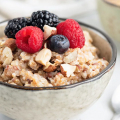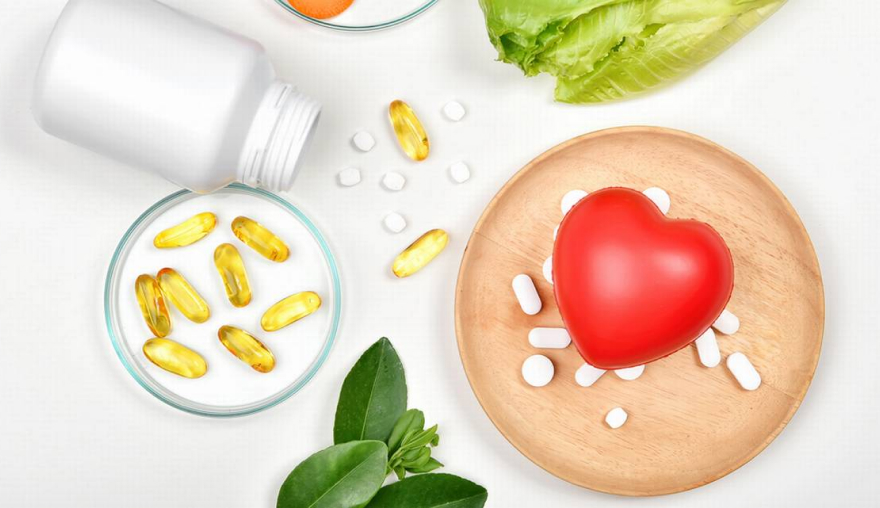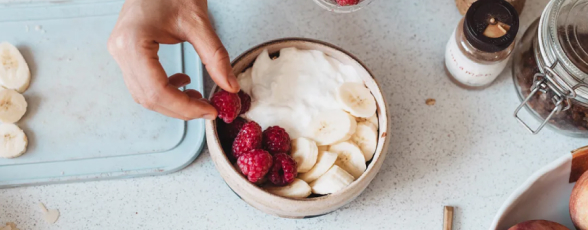Nowadays, the problem of excess weight and obesity is among the main causes which affect the quality of life and lead to various diseases. According to some reports, 13% of adults in the world suffer from obesity, while 39% are overweight.
Research shows that protein-rich food for weight loss is a great solution. Following a high-protein diet for 6-12 months contributes to effective weight loss and allows for keeping the kilos off. This type of nutrition contributes to improved body composition and provides some other benefits, including:
- increases metabolism by boosting energy needed to digest protein;
- provides a feeling of satiety for a long time;
- promotes glycogenesis (synthesis of glycogen from glucose with energy expenditure);
- stimulates ketogenesis, contributing to a breakdown of fat reserves.
What are high-protein foods for weight loss? We have prepared a complete list for you.
Meats
Chicken
Chicken is one of the best protein foods for weight loss. It contains a lot of proteins, especially in its lean part – the breast (30.9 g per 100 g). Other parts are suitable for dietary nutrition too. Also, chicken meat has amino acids essential for weight loss – arginine and leucine, which are necessary for building muscle tissue and renewing muscles. It is no surprise that chicken breast is the main product on the table of bodybuilders and professional athletes.
Beef
Beef contains 20-25g protein/100g. This high-protein and low-calorie (187 kcal/100 g) product ensures a lasting sense of satiety, improves the condition of the vessel walls, and reduces the risk of anemia. The leanest cut is taken from the hip of the cow.
Pork
The amount of digestible protein per 100 g of boiled pork meat is 26 g. This kind of meat is also a source of important micronutrients, such as iron, zinc, phosphorus, selenium, etc. Vitamins B6 and B12 are necessary for blood cell formation and full brain performance. However, you shouldn’t overeat pork because it is a fatty meat high in cholesterol.
Lamb
Lamb contains amino acids needed by our body for its normal functioning. There is 25 g of protein for each 100 g of meat. Besides, lamb is rich in zinc, iron, and selenium. And although it has more fat than beef, lamb meat contains a lot of beneficial omega-3 fats, vital for your heart, and is considered one of the most useful types of red meat.
Bison
There is about 20 g of protein per 100 g of bison meat. It practically does not contain saturated fats, thus considered a dietary product perfect for weight loss. However, this type of meat offers all necessary amino acids and conjugated linoleic acid (CLA), which has an anti-inflammatory effect.
Game
Studies have shown that wild game meat contains more proteins and essential fats than the meat of domestic animals. Protein content varies from 17,7 g to 23,7 g per 100, depending on the meat type. Deer, moose, and antelope meat have the smallest amount of fat. The main benefit of this product is that wild animals eat only natural food, unlike farm animals.
Fish
Halibut
Halibut is not without reason among good protein foods for weight loss. This fish contains 19 g of protein and just 1,9 g of fat per 100 g. Halibut is rich in vitamin D, phosphorus, and potassium. Also, it has a lot of selenium and beneficial omega-3 fats. Only half a serving of halibut filet can cover more than a third of your daily need for valuable substances.
Sole
Sole is high in protein: it contains up to 30 g/100 g. Regularly consuming this product will help replenish the reserves of phosphorus, potassium, sodium, selenium, and other essential trace elements. Moreover, sole filet is low-fat, making it a great weight loss product.
Snapper
This is another protein-rich fish that must be on your menu if you want to lose weight. 85 g of snapper contains 22.4 g of protein and only 2 g of fat, meaning 26 g of protein per 100 g. It is an excellent source of vitamins B6 and B12, selenium, phosphorus, and essential amino acids. Besides, fats contained in the product are mostly of polyunsaturated type.
Salmon
Salmon can be called the king among fish due to its perfect taste and valuable composition. Also, it is rich in protein: 100 g of fish contains about 20 g of protein. Moreover, wild salmon have more protein than farm ones. Salmon is a source of omega-3 fatty acids: eicosapentaenoic acid and docosahexaenoic acid, found only in seafood.
Sardines
100 g of sardines contains up to 20 g of proteins, a lot of selenium, calcium, and other essential minerals and vitamins. Like other oily fish, sardines have omega-3 fatty acids (4,8 g/100 g). These substances provide health benefits by improving cognitive function and preventing the development of cancer and arthritis.
Tuna
By protein content, tuna is comparable to beef; however, it has less fat: 100 g of canned tuna contains 24 g of protein and 3 g of fat. It is an excellent dietary product for brain and heart health, thanks to omega-3 fats. Also, the fish is rich in phosphorus and selenium.
Shellfish
Shrimp
100 g of shrimps contain up to 20 g of protein and a lot of zinc, providing normal immune system functioning. This product also contains astaxanthin – an orange and reddish pigment from algae that they eat. This substance prevents the development of oxidative stress, which damages cells and leads to various diseases.
Crab and lobster
Crabs and lobsters are not inferior to shrimps in terms of protein content: 18 g – 20 g/100 g, and can easily satisfy the body’s protein needs. Moreover, their meat contains vitamin B12, iron, zinc, and a lot of omega-3 fatty acids.
Mussels
Mussels have a high nutritional value and are a source of complete protein: 100 g of these mollusks contain 11-12 g of protein. It is slightly less than in other shellfish; however, one serving of mussels will cover your protein needs by almost a quarter.
Legumes
Lupini beans
Lupini beans, as well as other legumes, are high in plant protein: 100 g of this product contains 36 g of protein. Also, they are a great source of carbs, fiber, potassium, phosphorus, magnesium, and calcium. It is recommended to soak beans in water before cooking to remove some of the bitterness.
Lentils
Lentils have long been used in cooking, and enjoy the well-deserved love of gourmets due to their excellent taste. Lentils have about 24 g of proteins per 100 g of the product. It has a high energy value and is rich in micronutrients such as phosphorus, potassium, magnesium, and iron.
Black beans
This type of bean has a dense texture and sweet taste, making it welcome on any table. Its protein content is more than 20 g per 100g, so black beans are an excellent meat substitute for those who prefer vegetarian cuisine. Beans are rich in calcium, magnesium, phosphorus, and potassium.
Pinto beans
Pinto beans are very popular in Spain; even a dish was named after them. This nutrient and protein-rich product contains 20 g of protein per 100 g. The beans have a lot of calcium, magnesium, phosphorus, and potassium. Like other legumes, it is better to soak them in water before cooking.
Soy
Tofu
Tofu is a product made through curdling soy milk. It is low in calories, has a high nutritional value, and contains about 8 g of protein per 100 g. Tofu is rich in isoflavones that lower bad cholesterol and improve work of the cardiovascular system. Besides, it is high in calcium and potassium.
Tempeh
Tempeh, traditional Indonesian food, is made of fermented soybeans packed to form flatbread. The protein content in tempeh reaches 20 g per 100 g, while there are practically no carbohydrates in the product. It is rich in potassium, magnesium, phosphorus, and calcium. Due to fermentation, tempeh is easier to digest and can be consumed even by people allergic to soya.
Edamame
This is a Japanese dish prepared with immature boiled or steamed soybeans in the pod. Regular consumption of edamame helps reduce cholesterol. Moreover, green beans contain a lot of protein – about 12 g/100 g. Also, they are rich in phosphorus, potassium, magnesium, calcium, B vitamins, fiber, and omega-3.
Eggs
Eggs are, perhaps, one of the most popular products on our tables – you can cook a wide variety of dishes with them. Also, they are a source of animal protein: one medium-sized chicken egg contains about 6 g of protein, while 100 g of the product – about 12 g. Eggs are rich in phosphorus and potassium, folic acid, biotin, and choline, which provide beneficial effects on the nervous system.
Dairy products
Greek yogurt
100 g of Greek yogurt contains about 9 g of protein; however, this product has other unique, valuable benefits. Probiotics contribute to the normalization of microflora in the intestinal tract and even prevent the development of some types of cancer. Greek yogurt is rich in calcium, while its low-fat content makes it one of the best lean protein foods for weight loss.
Cottage cheese
This dairy product offers essential amino acids, minerals, and vitamins. 100 g of cottage cheese contains about 11 g of protein with low caloric content. Regularly consuming this product benefits bone health, the state of the cardiovascular system, the liver, etc. Fermentation makes cottage cheese digest better than whole milk.
Milk
Milk is considered a dietary product but is not suitable for people who are lactose intolerant. Calcium and phosphorus presence supports bone health and reduces the risk of osteoporosis in old age. 100 g of whole milk contains about 3 g of protein. Also, this drink has a lot of potassium and vitamin K2, which participate in bone tissue forming.
Subscribe to our blog
Get the latest insights.
Vegetables
Broccoli
The protein contained in broccoli is rich in amino acids and antioxidants and according to its beneficial properties is equal to protein contained in meat and eggs. This vegetable contains more than 2 g of protein per 100 g. Besides protein, broccoli is rich in coarse fiber that improves intestinal peristalsis, as well as vitamins and minerals.
Chinese cabbage
Chinese cabbage contains about 1,5 g of protein. Vitamins and minerals help maintain the health of the cardiovascular and nervous systems, strengthen bones, and prevent the development of osteoporosis. Chinese cabbage is a great source of vitamin A, essential for eye health, while coarse fiber improves intestinal motility.
Artichokes
Artichokes contain more than 3 g of protein per 100 g with low-calorie content and have rich vitamin and mineral composition. They are high in calcium, magnesium, phosphorus, potassium, and sodium, as well as vitamin C and chlorogenic acid, which is an antioxidant and has an anti-inflammatory effect, reducing the risk of some types of cancer, type 2 diabetes, and heart diseases.
Avocado
Avocado has a high nutritional value: 2 g of protein per 100 g, as well as 19% of fats, and 24% of dietary fiber. It has more potassium than bananas do. Also, it contains vitamins A, C, E, and folic acid. Regular consumption of avocados contributes to the reduction of bad cholesterol levels and supports heart health.
Brussels sprouts
100 g of Brussels sprouts have more than 3 g of protein. This vegetable is rich in potassium, calcium, and phosphorus. It is incredibly beneficial for the eyes due to vitamin A and lutein, which prevent degenerative processes in the retina and contribute to the preservation of visual function. Among other useful substances, avocados contain the following: vitamins A, B, and C, potassium, magnesium, phosphorus, and folic acid.
Nuts
Almonds
Almonds are a great source of valuable substances, and a handful of these nuts can cover a significant portion of the daily norm of some vitamins and minerals. Besides, in terms of protein content, almonds can be compared with meat: 100 g of the product contains more than 21 g of protein. Almonds help regulate blood glucose levels and improve intestinal motility due to the fiber they contain.
Pistachios
This is another healthy product that is recommended to have as a snack when following a diet. Pistachios effectively cope with hunger because they contain more than 20 g of protein per 100 g. Besides, they are rich in important unsaturated fats and antioxidants, which prevent inflammation.
Seeds
Pumpkin seeds
Pumpkin seeds can be called the most beneficial part of a pumpkin because they contain a huge amount of vitamins and minerals necessary for the body’s normal functioning. They are rich in protein: 100 g of the product contains almost 30 g of complete plant proteins. Pumpkin seeds can be added to various dishes or consumed separately, replenishing the reserves of magnesium, phosphorus, potassium, selenium, and other micronutrients.
Chia seeds
In addition to being rich in omega-3 fatty acids necessary for the work of many body systems; the protein content of Chia seeds is comparable to that of meat or fish: more than 16 g/100 g. The seeds also have fiber, carbs and fats, magnesium, phosphorus, potassium, selenium, zinc, and manganese. Including this product in your regular diet helps balance your hormones, improve vision, and prevent inflammation.
Hemp seeds
Hemp seeds have a wide array of health benefits; moreover, they are a great source of vegetable protein: more than 30 g of protein per 100 g. They are also rich in omega-3 and omega-6 acids, vitamins E, C, and D, amino acids, and mineral substances. Regular consumption of hemp seeds strengthens the heart, improves the state of the intestine and liver, and helps solve many other health problems.

Relevant article
Top 21 Best Foods for Weight Loss, According to ExpertsConclusion
By choosing high-protein foods for weight loss and muscle gain, you can diversify your diet with various products of both animal and plant origin. And it is also important to consider the composition of these products because some of them can contain not only protein but large amounts of fat, which increases the calorie content and is unsuitable for those who want to lose weight.
If your aim is to get rid of fat and increase muscle mass, you should choose products low in fats and those that improve intestinal motility.




